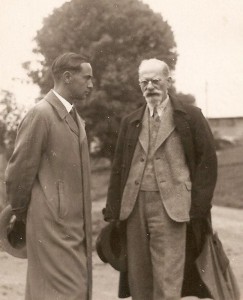[:en]
(Eugen Fink and Edmund Husserl, image by courtesy of the Philosophical Seminar of the Johannes Gutenberg-University Mainz)
Excerpt from: Eugen Fink – The questionability of the modern educator (Die Fragwürdigkeit des modernen Erziehers), in: Die deutsche Schule, Berlin/Hannover/Darmstadt, issue 4 1959, S. 149-162.
In the fundamental event of “education”, the human existence gains advice and support, form and constitution. The human being is a priori without orientation and insecure, formless and undefined. Only the imperfect living being is able and forced to bring itself in form and constitution. Education is necessary to overcome our existential plight. Only someone who finds himself in this existential plight can educate and can be educated. […] The human being lives in a mode of understanding care of the self: he puts himself into a practical relation to his own existence [Dasein] and to the Being [Sein] of all beings [Seiendes]. Yet, such self-relation is not a consequence of the “consciousness”, it is not a conscious reflexivity, but rather a more primordial and tense structure of existence. The human being is “his own task”, he must become what he is, must look for and fulfil the essence of his being. This is not a mechanical necessity, it is an existential need. The imperfection of our life does not only exist objectively, it is above all a felt, experienced and sustained incompletion. […]
This calls western anthropology into question, which is defined by metaphysics and describes the human being as a creature between animal and god. We are the imperfect beings [Seiendes] in a universe that is otherwise filled with perfect things and creatures; we are a cosmic exception and an ontological paradox. The self-care of the human being does not mean, like one might assume, a self-relationality of the single individual only to himself. The distinction of “I” and “You” itself already presumes the self-relation of existence [Dasein]. It is a fault of the common pedagogical theories to start naively from the relation between educator and student. Where does this reference come from? Where does the interest of the educator in his pupil come from? Are Me and You, We and the others given facts of the social world? Is it enough to point these facts out, or is a fundamental contemplation [Besinnung] necessary that experiences and discusses the pedagogical meaning of the social references as a problem in the first place?
The Philosophical Seminar of the Johannes Gutenberg-University Mainz wrote an interesting piece on Eugen Finks biography, you can find it here (only in German language).
On the main page of the Ophen Blog you can also find an extensive bibliography of Eugen Finks works: Eugen Fink on Ophen.org.[:de]
(Eugen Fink und Edmund Husserl, Bild mit freundlicher Genehmigung des Philosophischen Seminars der Johannes Gutenberg-Universität Mainz)
Exzerpt aus: Eugen Fink – Die Fragwürdigkeit des modernen Erziehers, in: Die deutsche Schule, Berlin/Hannover/Darmstadt, Heft 4 1959, S. 149-162.
Rat und Halt, Form und Verfassung gewinnt das menschliche Dasein in jenem fundamentalen Geschehen, das „Erziehung“ heißt. Der Mensch ist a priori ratlos und haltlos, formlos und ungefasst. Das imperfekte Lebewesen allein kann und muss sich in Form und Verfassung bringen. Erziehung wendet die Grundnot unseres Daseins. Erziehen und erzogen werden kann nur ein nothaftes Geschöpf. (…) Der Mensch lebt im verstehenden Selbstumgang: er verhält sich zu seinem eigenen Dasein und zum Sein alles Seienden überhaupt. Solches Selbstverhältnis ist aber keine Folge etwa des „Bewusstseins“, ist keine bewusstseinsmäßige Reflexivität, sondern eine viel ursprünglichere und spannungsreichere Existenzstruktur. Der Mensch ist sich „aufgegeben“, er muss werden, was er ist, muss sein Wesen suchen und verwirklichen. Dieses Müssen ist kein mechanischer Zwang, es ist eine existentielle Not. Die Imperfektheit unseres Lebens besteht nicht objektiv nur, sie ist vor allem gespürte, erfahrene und erlittene Unvollendung. (…)
Das bedeutet aber ein gewichtiges Fragezeichen an der Grundthese der abendländischen, von der Metaphysik bestimmten Anthropologie, die den Menschen als das Zwischenwesen zwischen Tier und Gott ansetzt. Wir sind das imperfekte Seiende in einem Weltall, das sonst von perfekten Dingen und Lebewesen erfüllt ist; wir sind kosmisch eine Ausnahme und ontologisch ein Paradox. Der Selbstumgang des Menschen besagt aber nicht, wie man vielleicht meinen möchte, eine Selbstbezüglichkeit des einzelnen Individuums nur auf sich selber. Die Unterscheidung von „Ich“ und „Du“ setzt seinerseits schon das Selbstverhältnis des Daseins voraus. Es ist ein Missstand der üblichen pädagogischen Theorien, dass sie naiv ansetzen bei der Relation zwischen Erzieher und Zögling. Woher kommt denn dieser Bezug? Woher kommt denn das Interesse des Erziehers an seinem Zögling? Sind Ich und Du, Wir und die anderen gegebene Tatsachen der Sozialwelt? Genügt es, sie aufzuzeigen – oder muss eine grundsätzliche Besinnung die pädagogische Bedeutung der sozialen Bezüge erst einmal als Problem erfahren und erörtern?
Die Internationale Eugen Fink-Forschungsstelle für phänomenologische Anthropologie und Sozialphilosophie am Philosophischen Seminar der Johannes Gutenberg-Universität Mainz hat einen lesenswerten Beitrag zur Biographie Eugen Finks veröffentlicht, diesen finden Sie hier.
Auf der Hauptseite des Ophen Blogs findet sich darüber hinaus eine umfangreiche Bibliographie Eugen Finks: Eugen Fink auf Ophen.org.[:]
Schreibe einen Kommentar
Du musst angemeldet sein, um einen Kommentar abzugeben.